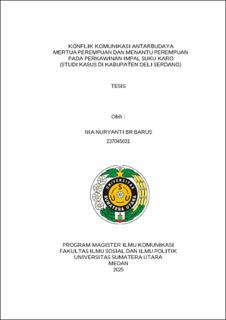Konflik Komunikasi Antarbudaya Mertua Perempuan dan Menantu Perempuan pada Perkawinan Impal Suku Karo (Studi Kasus di Kabupaten Deli Serdang)
Intercultural Communication Conflict Between Mother-in-Law and Daughterin-Law in Impal Marriages of the Karo Ethnic Group (A Case Study in Deli Serdang Regency)

Date
2025Author
Barus, Nia Nuryanti Br
Advisor(s)
Lubis, Lusiana Andriani
Ramadhani, Emilia
Metadata
Show full item recordAbstract
Impal marriage is a traditional practice unique to the Karo ethnic community in North Sumatra, in which a man marries his maternal aunt’s daughter. While this custom is believed to strengthen familial bonds, in practice, the relationship between mother-in-law and daughter-in-law in impal marriages often leads to conflict. This study aims to analyze the forms of conflict and the communication styles that emerge between mother-in-law and daughter-in-law in this context, focusing on the Karo community in Deli Serdang Regency. Using a qualitative approach and case study method, data were collected through in-depth interviews and observations involving three mother-in-law and daughter-in-law pairs, along with four triangulated sources including the husbands and Karo cultural experts. The findings reveal that conflict is triggered by unmet expectations, value differences, shifting social roles, and ineffective communication styles. Expectation Violation Theory and Face Negotiation Theory were applied to explain the dynamics of the emerging conflicts. The shift in status from aunt and niece to mother-in-law and daughter-in-law creates identity tensions and cultural expectations, which, if not managed through open communication, can lead to interpersonal breakdowns within traditional family structures.
Collections
- Master Theses [362]
